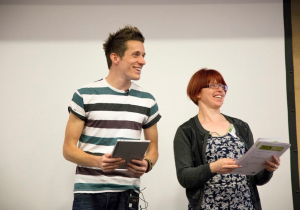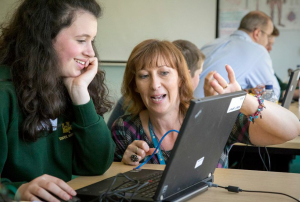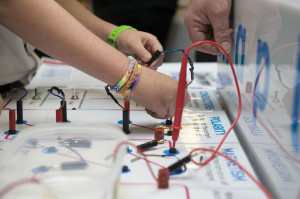If you work in Science and Tech and want to help young people see the opportunities in your industry it’s helpful to understand the difference between being an inspiration and being a turn off.
 Research shows one off interventions may re-inforce decisions which students have already made but won’t necessarily convince the ‘floating voter’. So consider how you can build long term relationships with schools and work with students on projects like the TeenTech Awards. Think about how best to reach the students you most need to reach. The ones who are perhaps oblivious to their own potential. Remember they may find it much easier to relate to apprentices and graduate trainees than to your CEO, who may impress but leave them thinking they could never achieve the same heights.
Research shows one off interventions may re-inforce decisions which students have already made but won’t necessarily convince the ‘floating voter’. So consider how you can build long term relationships with schools and work with students on projects like the TeenTech Awards. Think about how best to reach the students you most need to reach. The ones who are perhaps oblivious to their own potential. Remember they may find it much easier to relate to apprentices and graduate trainees than to your CEO, who may impress but leave them thinking they could never achieve the same heights.
At TeenTech we run workshops to help organisations learn how to communicate powerfully with young people and their parents.
But here are some tips from teachers who have contributed to the Digital Skills For Tomorrow’s World report on what really helps if you want to work with their students. Everyone wants your visit or engagment to be a big success and there are some helpful ideas here
If you have further suggestions, please add them.
What works
‘Explaining the links between curricular material and what lies ahead in HE and the workplace’
‘Making sessions ‘hands-on’ or interactive’
‘Find out as much as you can about the students. Make sure you contact the teacher and discuss your plans before your visit. Teachers understand their students and will offer good suggestions for how to make the session work well”
‘Run sessions which explain opportunities and routes to particular forms of employment. I often feel that careers advisors give poor advice and often pupils are not honest with them.’
‘Making them understand they CAN do it and be part of the future – that it is not just for people from the South/public schools etc’
‘You need to inspire students and share your own experiences & beginnings, most students do not aim high enough & realise most professionals were like them once’
‘Students want to see how it is relevant to them, what they need to do to get there’
‘Tell them how much you can earn. They are materialistic in a lot of ways’
‘Provide materials so the teacher can run your activity with other classes.’
What to avoid
‘Don’t try to be ‘cool’ to relate to ‘the kids’. It’s so frustrating when companies don’t enlist the help of teachers to plan such events.’
‘Many speakers are so DULL. Avoid using language that the students don’t understand. Remember you are talking to children, not adults, with short attention spans. Some bore the students, they need to be entertainers.As a teacher I often feel like I should be doing a dance at the front of the class to keep them interested, so therefore it has to be interactive’
‘There’s a tendency to assume that they already know what is required or what is best for others. Tendency to preach rather than listen’
‘Trying to hijack events/resources for profit/their own benefit’
‘One came into our school and told the students he didn’t pass some GCSEs but did OK for himself…then compounded this by announcing that he wasn’t even a technical professional, he just did presentations for them around the country! Disaster!’
‘Pitching the subject matter at the wrong age range…what might seem interesting to the company might not be interesting for the students.’
‘Too much talking and not enough hands on activities’


